
Would you like to start a conversation with other industry leaders to brainstorm a challenge or to just know more on a particular topic?
Engage in online discussions with your Peers
Start NowSolenis is a global manufacturer of specialty chemicals for the pulp, paper, oil and gas, petroleum refining, chemical processing, mining, biorefining, power and municipal markets. The product portfolio includes process aids, water treatment chemistries and functional additives as well as state-of-the-art monitoring and control systems. These technologies are used by our customers to improve operational efficiencies, enhance product quality, protect plant assets and minimize environmental impact. Headquartered at Wilmington, Delaware, in the United States, the company operates 40 manufacturing facilities located around the globe, and employs a team of 5,200 professionals, including 1,300 field representatives active in 120 countries.
Creation of an Idea
In 2015, Solenis created a Global Shared Services organization (GSS) based at Hyderabad, India.
The intention was to create a specialist in-house
organization with advanced capabilities to carry out business
processes and provide value from a cost perspective.
The newly formed organization was to bring in process consistency, standardize and improve outcomes, enhance decision-making support systems, and raise the bar on governance and risk management.
The GSS transformation journey began by moving a few Finance processes from Europe, with a team of 15 FTEs. Consistently over the next several months and quarters, various processes were systematically added to the centre in Hyderabad, from diverse business functions and global locations. Currently the GSS team handles not just Finance, but also functions such as Supply Chain, Legal, Product Management, Product Regulatory, Business Analytics, Information Technology, Procurement operations, Equipment support & Remote monitoring, etc. As part of the service catalogue the centre also offers specialist functions such as Master Data Management, Reporting, Treasury, and Quality Management.
Over the period, the centre has not only grown in numbers, but has also showcased significant maturity. Processes progressively higher-up on the process value chain have also been transitioned to the centre. The newer processes to transition are more complex and considered closer to ‘core’ at the business level. Reporting capabilities have enhanced substantially and knowledge-based process around Product Regulatory, Legal, Treasury and Business Analytics have been introduced. From a small start, the centre is now routinely collaborating on global transition and other projects. Several process improvement initiatives including six sigma projects generated at the GSS centre have been implemented by the business functions.
Right from the beginning, GSS has been run very professionally. There has been a clear understanding amongst the GSS leadership that operating a shared service centre requires unique and powerful capabilities. One of them is having a structured approach around each and every activity – right from setting the vision to managing day-to-day operations, people and processes.
The GSS Vision
“To build best-in-class shared services with a focus on driving growth culture, along with optimizing cost, process standardization, support of organization-wide strategic initiatives and transformation of processes across the global functions.”
The vision uses a five-pronged approach towards service delivery, using the five strategic and core components of service – Process & Controls, Technology & Data; People & Organization; Stakeholder Management; and Governance & Services Management. The following infographic gives the relationship of these core components with the capabilities enabled by them.
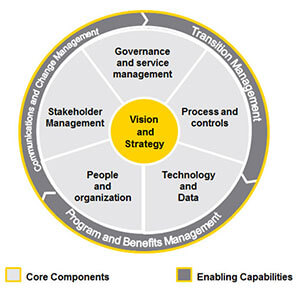
Amongst others, the vision delivers:
- Improved operating effectiveness,
- Benefits of scale,
- Freeing up time of onshore resources,
- Create and enhance quality culture,
- Lower costs, and
- A stronger control environment and seamless business continuity.
A feature that the leadership team at GSS believes
and follows is that of ‘Absolute Quality’. To that extent, the
three phases of delivery excellence are managed with
a simple but targeted approach for each of them.
Approach to Deliver – Transition Excellence Phase
Transition approach is a very focused methodology of carrying out process movements – from feasibility study to knowledge transfer to BAU, as in the infographic below. This phase also includes collaboration with the onshore SMEs and leaders.
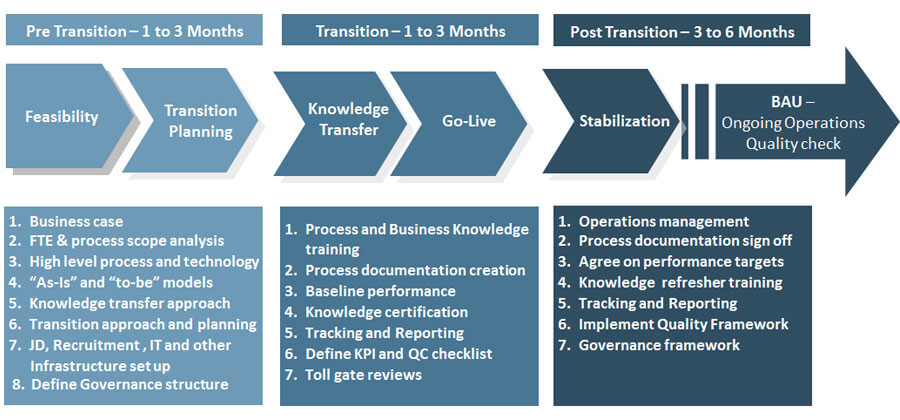
Approach to deliver – Operational Excellence Phase
Under this phase, incremental and accelerated improvements are carried out within the processes in a controlled and regulated manner. There are four components in this phase – Process Management, People Management, Knowledge Management and Continuous Improvement. The focus is on improving both efficiency and effectiveness. Specific attention is given to quality of output, speed of delivery, controls and governance.
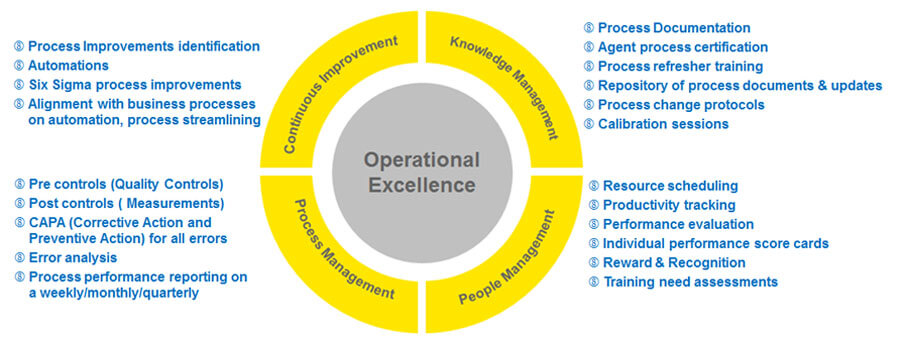
Approach to deliver– Maturity Excellence Phase
The key to long-term value creation is to have a clear long-term game plan for each of the processes under GSS influence. GSS plays the pivotal role in not only managing and improving the processes, but also guiding the parent businesses towards a path of ‘value add’. GSS follows a process maturity model, which is a six-stage partnership matrix that moves the process up the value chain and increases the level of collaboration with the parent customer, as the processes mature.
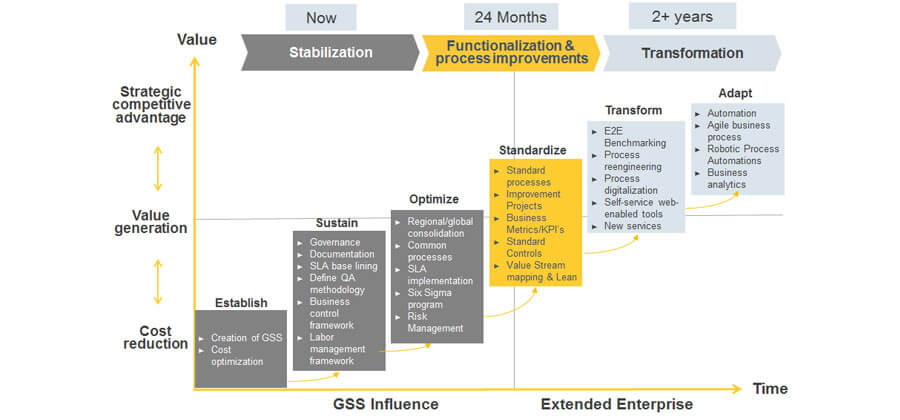
The GSS has a very focused approach on process improvements.
The concept of Absolute Quality is applied to global operations
as well as to GSS specific ones.
A Culture of Continuous Improvement
The GSS has a very focused approach on process improvements. The concept of Absolute Quality is applied to global operations as well as to GSS specific ones, as given below:
- Lean Six Sigma has been leveraged well to run 12 effectiveness projects and almost 300 process improvement ideas have been implemented in the last two years alone, with an annual value impact of around US$ 500,000.
- Six Sigma improvement projects have created a process efficiency of around 5000 hours and an annual saving of US$ 150,000.
- Hiring strategy has continuously evolved, based on the process maturity. Right-fit hiring helped save US$100,000 in fiscal 2019.
- RPA has been initiated in many processes to have the activities automated. This has helped save around 10% FTEs in those processes.
- Significant improvements in processes under GSS influence, such as on-time payments, vendor discount capture, day outstanding reduction, and vendor open item clearance.
- The new joiner training has become robust and effective, as the organisation has grown. SOPs are in place for each activity and learning curve has reduced by 50% since the beginning.
- The team works hand in hand with the IT Centre of Excellence and have together enhanced process efficiency through several system capabilities, tool enhancements and process engineering initiatives.
Each of the GSS Process has defined SLAs and KPIs. All improvements are measured only through these metrics. These metrics
A People’s Organisation
Solenis GSS recorded its annual attrition for year October 2018 – September 2019 at 3%. This is a far cry from the reported average attrition rates within the shared services industry in India. In November 2019, the centre was also certified as a ‘Great Place to Work’, by the Great Place to Work Institute.
The above two examples are true indicators of the professionalism and care demonstrated by the GSS leadership towards its employees. Some of the initiatives that have helped create a winning culture are:
A well structured Rewards & Recognition program aligned to the global R&R. Public acknowledgement and praise are liberally given out to individuals and teams by the leaders. Monthly town-hall meetings are used to share client feedback. A quarterly R&R event is organised especially to reward top performers. As a result, the teams take personal pride in their work and they feel appreciated for their hard work.
Employee engagement. Support activities (sports, fun competitions, regional holiday events, family events, community services etc.) are created through the year. Initiatives that are fun in nature bond the teams together. The teams and their families interact often, beyond their day jobs and forge even greater kinship.
Doctrine of corporate ideology. Clear connection to organizational objectives is weaved into every meeting, every communication and every fun event. The teams feel aligned to organizational goals at all times. A GSS initiative called ‘Culture and Beliefs’ creates awareness amongst the existing employees and new joiners right from day one, to blend with the corporate values.
Capability enhancement. There is a continuous cycle of training and development across the organisation - in groups and individually. Due to an inclusive culture, employees are encouraged to learn new concepts and skills - Six Sigma and Project Management, to name a few. Additionally, a GSS Initiative on ‘Employee Development’ monitors and executes trainings in areas where team members need support and education.
Leadership engagement. Local as well as global leadership is fully engaged at all levels. The teams feel a clear connection with leadership at Hyderabad and Corporate office at USA. Frequent town hall meetings are carried out with the teams to give them an opportunity to ask timely questions and keep them abreast with organisational updates.
Performance development. Performance expectation parameters are very well defined upfront. Feedback on mismatch with expected performance is given in real time and support is offered to the employee for further development. Counsellors meet the team members periodically to update, discuss issues and concerns and, do a performance assessment. However, the culture of penalising employees for under-performance and errors is strictly avoided. This creates a culture where the employee feels safe getting a feedback and responds constructively to it.
Solenis GSS – Future plans
Today, the GSS has a blend of processes – newly established, as well as matured. In several areas GSS is a strategic business partner and collaborates with the functions on mega projects. For instance, the GSS teams are working closely with the business and external partners to impact positively towards the company’s working capital management by providing services through improved O2C and S2P processes. The GSS is also actively involved in corporate mega projects as well, such as project support in mergers and acquisitions – future mergers and acquisitions are likely to be managed principally from GSS. Professional in-house capabilities have been developed to support the functions directly in such activities.
GSS teams are working closely with the business to impact
positively towards the company’s working capital management
by providing services through improved O2C and S2P processes.
The GSS is also actively involved in corporate mega projects as well,
such as project support in mergers and acquisitions.
At an operating level, the plan is to offer world-class services to all the functions and all the geographies in the organization by bringing in the best-in-class class technologies, best-in-class industry practices and best-in-class people processes – the three key components of all transformation journeys.
The Solenis GSS has come a long way by showcasing its excellent performance and service. It is rapidly progressing towards becoming a strategic partner to the business and a true contributor of value for the organization.
ABOUT THE AUTHOR
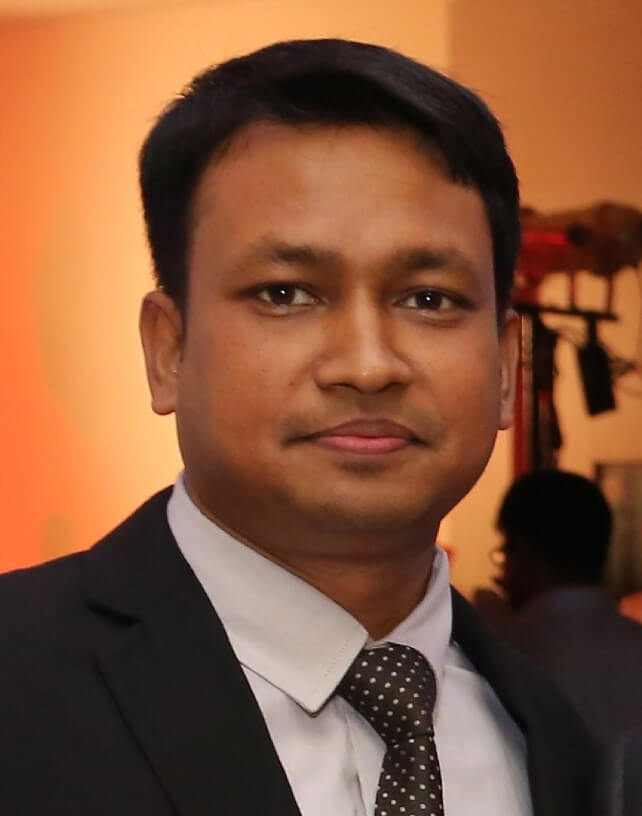
Dhiraj is Director & Center Head – Solenis Global Shared Services, Hyderabad. He is a results-oriented leader with 18 years of experience in strategic management, business development, transitions, operations management, quality management and people management with international exposure. He carries insightful experience in the service delivery/ operational capabilities and has worked extensively in varied areas of multi functionalities. He is a professional with good communication, leadership, team management, client relationship management, analytical and co-ordination skills. He is comfortable in interacting with customers across hierarchical levels in the organization for smooth execution and completion of projects/ /assignments.
Dhiraj has extensive experience in managing entire process operations with an aim to accomplish organizational goals. He has worked on numerous global projects for setting up shared services, process transitions, processes improvements and enhancement of shared services capabilities. His expertise include Business Control & Compliance, Quality Assurance & Reporting, Continuous Improvement, Process Transitions, Project Management, Service Delivery and Operations Management.




